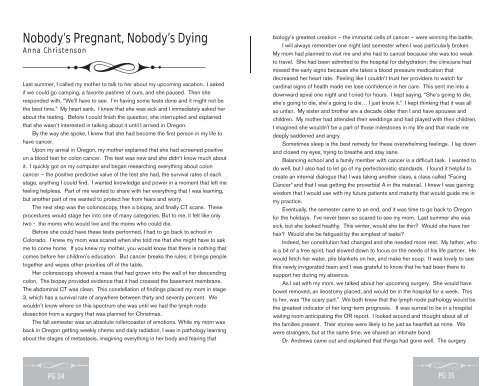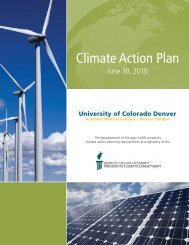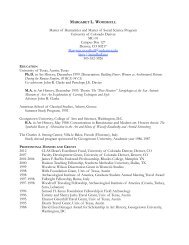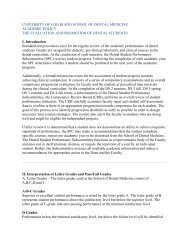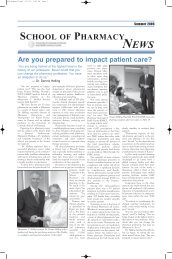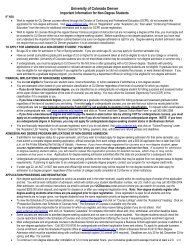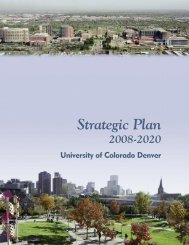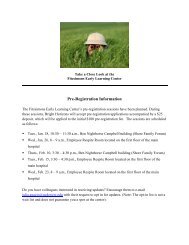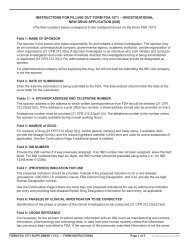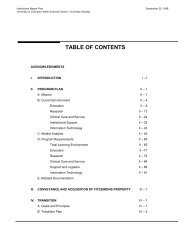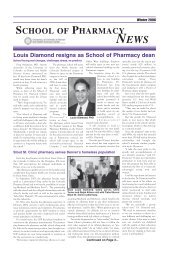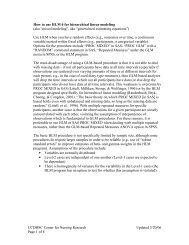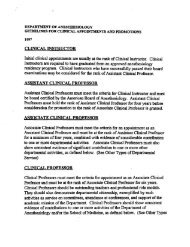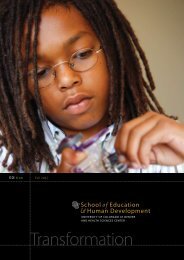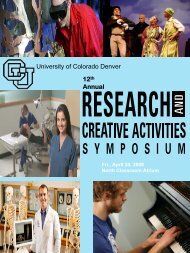The Human Touch 2013 - University of Colorado Denver
The Human Touch 2013 - University of Colorado Denver
The Human Touch 2013 - University of Colorado Denver
Create successful ePaper yourself
Turn your PDF publications into a flip-book with our unique Google optimized e-Paper software.
Nobody’s Pregnant, Nobody’s Dying<br />
Anna Christenson<br />
Last summer, I called my mother to talk to her about my upcoming vacation. I asked<br />
if we could go camping, a favorite pastime <strong>of</strong> ours, and she paused. <strong>The</strong>n she<br />
responded with, “We’ll have to see. I’m having some tests done and it might not be<br />
the best time.” My heart sank. I knew that she was sick and I immediately asked her<br />
about the testing. Before I could fi nish the question, she interrupted and explained<br />
that she wasn’t interested in talking about it until I arrived in Oregon.<br />
By the way she spoke, I knew that she had become the fi rst person in my life to<br />
have cancer.<br />
Upon my arrival in Oregon, my mother explained that she had screened positive<br />
on a blood test for colon cancer. <strong>The</strong> test was new and she didn’t know much about<br />
it. I quickly got on my computer and began researching everything about colon<br />
cancer – the positive predictive value <strong>of</strong> the test she had, the survival rates <strong>of</strong> each<br />
stage, anything I could fi nd. I wanted knowledge and power in a moment that left me<br />
feeling helpless. Part <strong>of</strong> me wanted to share with her everything that I was learning,<br />
but another part <strong>of</strong> me wanted to protect her from fears and worry.<br />
<strong>The</strong> next step was the colonoscopy, then a biopsy, and fi nally CT scans. <strong>The</strong>se<br />
procedures would stage her into one <strong>of</strong> many categories. But to me, it felt like only<br />
two - the moms who would live and the moms who could die.<br />
Before she could have these tests performed, I had to go back to school in<br />
<strong>Colorado</strong>. I knew my mom was scared when she told me that she might have to ask<br />
me to come home. If you knew my mother, you would know that there is nothing that<br />
comes before her children’s education. But cancer breaks the rules; it brings people<br />
together and wipes other priorities <strong>of</strong>f <strong>of</strong> the table.<br />
Her colonoscopy showed a mass that had grown into the wall <strong>of</strong> her descending<br />
colon. <strong>The</strong> biopsy provided evidence that it had crossed the basement membrane.<br />
<strong>The</strong> abdominal CT was clean. This constellation <strong>of</strong> fi ndings placed my mom in stage<br />
3, which has a survival rate <strong>of</strong> anywhere between thirty and seventy percent. We<br />
wouldn’t know where on this spectrum she was until we had the lymph node<br />
dissection from a surgery that was planned for Christmas.<br />
<strong>The</strong> fall semester was an absolute rollercoaster <strong>of</strong> emotions. While my mom was<br />
back in Oregon getting weekly chemo and daily radiation, I was in pathology learning<br />
about the stages <strong>of</strong> metastasis, imagining everything in her body and fearing that<br />
biology’s greatest creation – the immortal cells <strong>of</strong> cancer – were winning the battle.<br />
I will always remember one night last semester when I was particularly broken.<br />
My mom had planned to visit me and she had to cancel because she was too weak<br />
to travel. She had been admitted to the hospital for dehydration; the clinicians had<br />
missed the early signs because she takes a blood pressure medication that<br />
decreased her heart rate. Feeling like I couldn’t trust her providers to watch for<br />
cardinal signs <strong>of</strong> health made me lose confi dence in her care. This sent me into a<br />
downward spiral one night and I cried for hours. I kept saying, “She’s going to die,<br />
she’s going to die, she’s going to die… I just know it.” I kept thinking that it was all<br />
so unfair. My sister and brother are a decade older than I and have spouses and<br />
children. My mother had attended their weddings and had played with their children.<br />
I imagined she wouldn’t be a part <strong>of</strong> those milestones in my life and that made me<br />
deeply saddened and angry.<br />
Sometimes sleep is the best remedy for these overwhelming feelings. I lay down<br />
and closed my eyes, trying to breathe and stay sane.<br />
Balancing school and a family member with cancer is a diffi cult task. I wanted to<br />
do well, but I also had to let go <strong>of</strong> my perfectionistic standards. I found it helpful to<br />
create an internal dialogue that I was taking another class, a class called “Facing<br />
Cancer” and that I was getting the proverbial A in the material. I knew I was gaining<br />
wisdom that I would use with my future patients and maturity that would guide me in<br />
my practice.<br />
Eventually, the semester came to an end, and it was time to go back to Oregon<br />
for the holidays. I’ve never been so scared to see my mom. Last summer she was<br />
sick, but she looked healthy. This winter, would she be thin? Would she have her<br />
hair? Would she be fatigued by the simplest <strong>of</strong> tasks?<br />
Indeed, her constitution had changed and she needed more rest. My father, who<br />
is a bit <strong>of</strong> a free spirit, had slowed down to focus on the needs <strong>of</strong> his life partner. He<br />
would fetch her water, pile blankets on her, and make her soup. It was lovely to see<br />
this newly invigorated team and I was grateful to know that he had been there to<br />
support her during my absence.<br />
As I sat with my mom, we talked about her upcoming surgery. She would have<br />
bowel removed, an ileostomy placed, and would be in the hospital for a week. This<br />
to her, was “the scary part.” We both knew that the lymph node pathology would be<br />
the greatest indicator <strong>of</strong> her long-term prognosis. It was surreal to be in a hospital<br />
waiting room anticipating the OR report. I looked around and thought about all <strong>of</strong><br />
the families present. <strong>The</strong>ir stories were likely to be just as heartfelt as mine. We<br />
were strangers, but at the same time, we shared an intimate bond.<br />
Dr. Andrews came out and explained that things had gone well. <strong>The</strong> surgery<br />
PG 34<br />
PG 35


